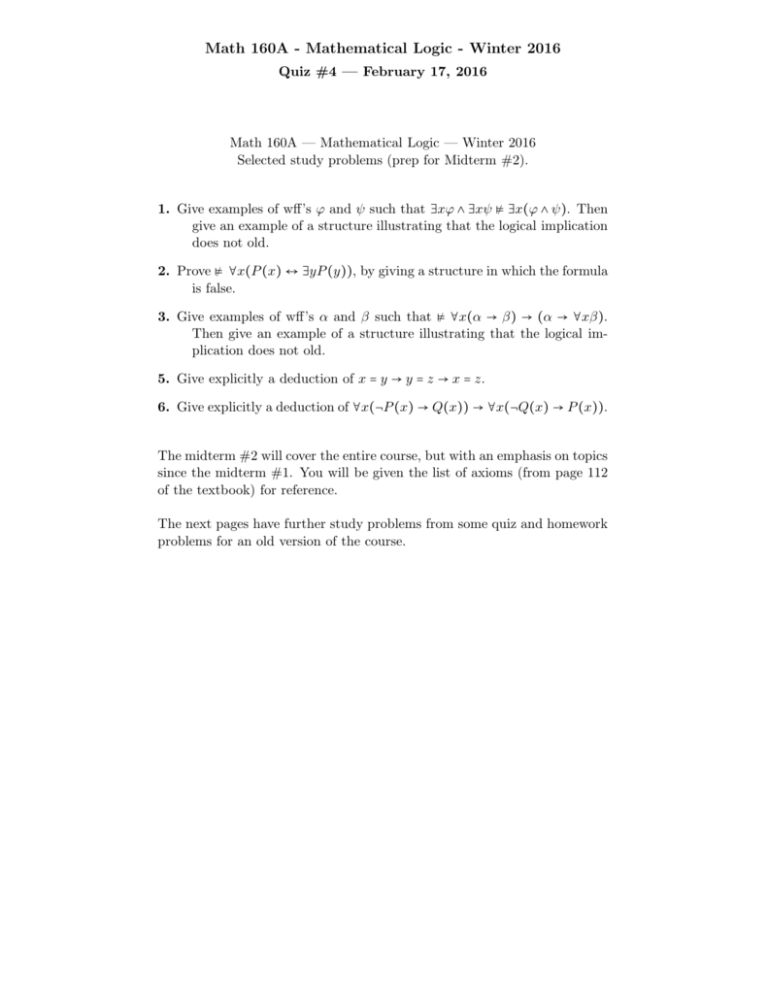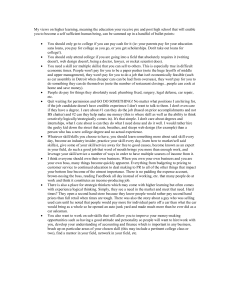Math 160A - Mathematical Logic - Winter 2016
advertisement

Math 160A - Mathematical Logic - Winter 2016 Quiz #4 — February 17, 2016 Math 160A — Mathematical Logic — Winter 2016 Selected study problems (prep for Midterm #2). 1. Give examples of wff’s ϕ and ψ such that ∃xϕ ∧ ∃xψ ⊭ ∃x(ϕ ∧ ψ). Then give an example of a structure illustrating that the logical implication does not old. 2. Prove ⊭ ∀x(P (x) ↔ ∃yP (y)), by giving a structure in which the formula is false. 3. Give examples of wff’s α and β such that ⊭ ∀x(α → β) → (α → ∀xβ). Then give an example of a structure illustrating that the logical implication does not old. 5. Give explicitly a deduction of x = y → y = z → x = z. 6. Give explicitly a deduction of ∀x(¬P (x) → Q(x)) → ∀x(¬Q(x) → P (x)). The midterm #2 will cover the entire course, but with an emphasis on topics since the midterm #1. You will be given the list of axioms (from page 112 of the textbook) for reference. The next pages have further study problems from some quiz and homework problems for an old version of the course. Name: Math 160A - Winter 2002 - Quiz #4 Instructor: Sam Buss - UCSD - March 1, 2002 Express each of the English sentences as a first-order formula. If the sentence is ambiguous, use your best judgement on what it means, and explain what is ambiguous and how you resolved the ambiguity. You may use our conventions on abbreviating formulas. The universe of objects is a population of people (workers). Every person has exactly one boss. The first order language has the following symbols: H and L are predicate symbols, and b is a unary function symbol. Equality (=) is also in the language. Their meanings are: H(x) - “x is honest” L(x, y) “x likes y” b(x) - “the person who is x’s boss” 1. Some honest people do not like themselves. 2. No dishonest person likes himself. 3. No honest person is disliked by everyone. 4. No one likes their boss. 5. There are two people who have the same boss. 6. There is an honest person who is the boss of everyone. 7. Every honest person is the boss of someone. 8. Anyone who is their own boss likes himself. 9. No one is liked by the boss of their boss. 9. There is a person who dislikes his boss, but likes everyone else. Math 160A - Winter 2002 - Homework #5 Instructor: Sam Buss - UC San Diego Due Wednesday, February 27. From the textbook. Section 2.1, pages 79-80: Problems 7, 8, 10. For the next problems, use the language of arithmetic, with symbols =, <, 0, S, +, ·, E. Express each of the following statements as a formula (you may abbreviate the formula: it is not necessary to give the formal expression for the wff.) (a) “x divides y”. (b) “x is greater than 1”. (c) “x is a prime”. (d) “Every prime factor of x is a prime factor of y”. (e) “There are arbitrarily large primes”. (Hint: express by saying there is no number bigger than all primes.) Now, for each of the five formulas that were your answers to problems (a)-(e), tell which variables occur free in the formulas. Finally, rewrite your answers to (a) and (b) as a fully written out (nonabbreviated) well-formed formulas. 1 Name: Math 160A - Winter 2002 - Quiz #5 Instructor: Sam Buss - UCSD - March 11, 2002 Give examples (counter-examples) of structures which prove the following three statements. Be sure to describe explicitly the universe and the interpretation of each non-logical symbol. 1. ∃x∀yP (y, x) 2 ∃x∀yP (x, y). 2. ∀x∃y(y ≤ x) 2 ∃x∀y(x ≤ y). 3. ∀x(f (x) ≤ x) 2 ∃x∀y(x ≤ y).






